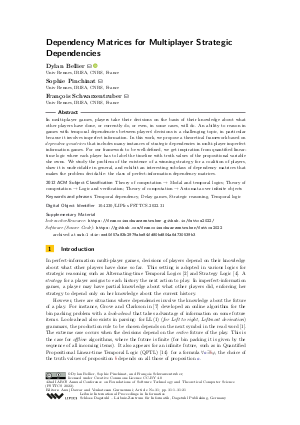Dependency Matrices for Multiplayer Strategic Dependencies
Authors
Dylan Bellier  ,
Sophie Pinchinat,
François Schwarzentruber
,
Sophie Pinchinat,
François Schwarzentruber
-
Part of:
Volume:
42nd IARCS Annual Conference on Foundations of Software Technology and Theoretical Computer Science (FSTTCS 2022)
Part of: Series: Leibniz International Proceedings in Informatics (LIPIcs)
Part of: Conference: IARCS Annual Conference on Foundations of Software Technology and Theoretical Computer Science (FSTTCS) - License:
 Creative Commons Attribution 4.0 International license
Creative Commons Attribution 4.0 International license
- Publication Date: 2022-12-14
File

PDF
LIPIcs.FSTTCS.2022.31.pdf
- Filesize: 0.87 MB
- 21 pages
Document Identifiers
Subject Classification
ACM Subject Classification
- Theory of computation → Modal and temporal logics
- Theory of computation → Logic and verification
- Theory of computation → Automata over infinite objects
Keywords
- Temporal dependency
- Delay games
- Strategic reasoning
- Temporal logic
Metrics
- Access Statistics
-
Total Accesses (updated on a weekly basis)
0Document
0Metadata
Abstract
In multi-player games, players take their decisions on the basis of their knowledge about what other players have done, or currently do, or even, in some cases, will do. An ability to reason in games with temporal dependencies between players' decisions is a challenging topic, in particular because it involves imperfect information. In this work, we propose a theoretical framework based on dependency matrices that includes many instances of strategic dependencies in multi-player imperfect information games. For our framework to be well-defined, we get inspiration from quantified linear-time logic where each player has to label the timeline with truth values of the propositional variable she owns. We study the problem of the existence of a winning strategy for a coalition of players, show it is undecidable in general, and exhibit an interesting subclass of dependency matrices that makes the problem decidable: the class of perfect-information dependency matrices.
Cite As Get BibTex
Dylan Bellier, Sophie Pinchinat, and François Schwarzentruber. Dependency Matrices for Multiplayer Strategic Dependencies. In 42nd IARCS Annual Conference on Foundations of Software Technology and Theoretical Computer Science (FSTTCS 2022). Leibniz International Proceedings in Informatics (LIPIcs), Volume 250, pp. 31:1-31:21, Schloss Dagstuhl – Leibniz-Zentrum für Informatik (2022)
https://doi.org/10.4230/LIPIcs.FSTTCS.2022.31
BibTex
@InProceedings{bellier_et_al:LIPIcs.FSTTCS.2022.31,
author = {Bellier, Dylan and Pinchinat, Sophie and Schwarzentruber, Fran\c{c}ois},
title = {{Dependency Matrices for Multiplayer Strategic Dependencies}},
booktitle = {42nd IARCS Annual Conference on Foundations of Software Technology and Theoretical Computer Science (FSTTCS 2022)},
pages = {31:1--31:21},
series = {Leibniz International Proceedings in Informatics (LIPIcs)},
ISBN = {978-3-95977-261-7},
ISSN = {1868-8969},
year = {2022},
volume = {250},
editor = {Dawar, Anuj and Guruswami, Venkatesan},
publisher = {Schloss Dagstuhl -- Leibniz-Zentrum f{\"u}r Informatik},
address = {Dagstuhl, Germany},
URL = {https://drops.dagstuhl.de/entities/document/10.4230/LIPIcs.FSTTCS.2022.31},
URN = {urn:nbn:de:0030-drops-174230},
doi = {10.4230/LIPIcs.FSTTCS.2022.31},
annote = {Keywords: Temporal dependency, Delay games, Strategic reasoning, Temporal logic}
}
Author Details
Supplementary Materials
- InteractiveResource https://francoisschwarzentruber.github.io/fsttcs2022/
-
Software (Source Code)
https://github.com/francoisschwarzentruber/fsttcs2022
browse
 archived version
archived version
References
- Alfred V. Aho, Ravi Sethi, and Jeffrey D. Ullman. Compilers: Principles, Techniques, and Tools. Addison-Wesley series in computer science / World student series edition. Addison-Wesley, 1986. URL: https://www.worldcat.org/oclc/12285707.
-
Rajeev Alur, Thomas A Henzinger, and Orna Kupferman. Alternating-time temporal logic. Journal of the ACM (JACM), 49(5):672-713, 2002.

-
Robert Berger. The undecidability of the domino problem. American Mathematical Soc., 1966.

-
Krishnendu Chatterjee, Thomas A Henzinger, and Nir Piterman. Strategy logic. Information and Computation, 208(6):677-693, 2010.

-
Bernd Finkbeiner. Synthesis of reactive systems. Dependable Software Systems Engineering, 45:72-98, 2016.

-
David Gale and Frank M Stewart. Infinite games with perfect information. Contributions to the Theory of Games, 2(245-266):2-16, 1953.

- Edward F. Grove. Online bin packing with lookahead. In Kenneth L. Clarkson, editor, Proceedings of the Sixth Annual ACM-SIAM Symposium on Discrete Algorithms, 22-24 January 1995. San Francisco, California, USA, pages 430-436. ACM/SIAM, 1995. URL: http://dl.acm.org/citation.cfm?id=313651.313781.
- Felix Klein and Martin Zimmermann. What are strategies in delay games? borel determinacy for games with lookahead. arXiv preprint, 2015. URL: http://arxiv.org/abs/1504.02627.
-
Felix Klein and Martin Zimmermann. How much lookahead is needed to win infinite games? Logical Methods in Computer Science, 12, 2017.

-
Gary Peterson, John Reif, and Salman Azhar. Lower bounds for multiplayer noncooperative games of incomplete information. Computers & Mathematics with Applications, 41(7-8):957-992, 2001.

-
Nir Piterman. From nondeterministic Büchi and Streett automata to deterministic parity automata. Logical Methods in Computer Science, 3, 2007.

-
A Pnueli and R Rosner. On the synthesis of reactive systems. POPL, Austin, Texas, pages 179-190, 1989.

-
Amir Pnueli. The temporal logic of programs. In 18th Annual Symposium on Foundations of Computer Science (sfcs 1977), pages 46-57. IEEE, 1977.

-
A Prasad Sistla, Moshe Y Vardi, and Pierre Wolper. The complementation problem for Büchi automata with applications to temporal logic. Theoretical Computer Science, 49(2-3):217-237, 1987.

-
Aravinda Prasad Sistla. Theoretical issues in the design and verification of distributed systems. Harvard University, 1983.

-
Wolfgang Thomas, Lukasz Kaiser, and Michael Holtmann. Degrees of lookahead in regular infinite games. Logical Methods in Computer Science, 8, 2012.

-
Moshe Y Vardi and Pierre Wolper. Automata-theoretic techniques for modal logics of programs. Journal of Computer and System Sciences, 32(2):183-221, 1986.

